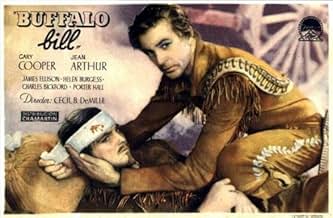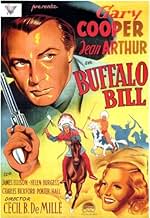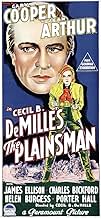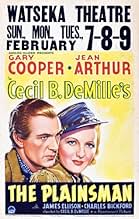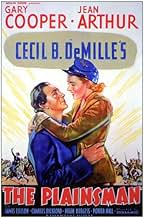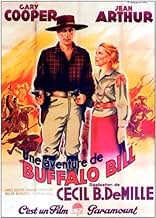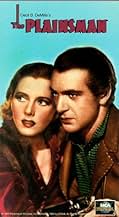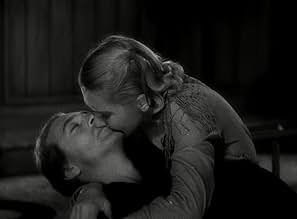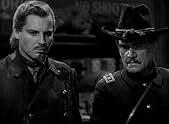IMDb RATING
6.8/10
2.6K
YOUR RATING
Wild Bill Hickok and Buffalo Bill Cody attempt to stop an Indian uprising that was started by white gun-runners.Wild Bill Hickok and Buffalo Bill Cody attempt to stop an Indian uprising that was started by white gun-runners.Wild Bill Hickok and Buffalo Bill Cody attempt to stop an Indian uprising that was started by white gun-runners.
- Awards
- 3 wins total
Fred Kohler
- Jake - A Teamster
- (as Fred Kohler Sr.)
Pat Moriarity
- Sgt. McGinnis
- (as Pat Moriarty)
Featured reviews
After the failure of "The Crusades" at the box office, Cecil B. DeMille stopped doing films about non-American history. His films for the next thirteen years were about our history from Jean Lafitte to World War II (Dr. Wassell). The first in order of production was this film, starring Gary Cooper as Wild Bill Hickok, with Jean Arthur as Calamity Jane. James Ellison was Buffalo Bill, John Miljan (not a villain as usual) was General George A. Custer, and Anthony Quinn was one of the Indians who fought at Little Big Horn. The villains were led by Charles Bickford (selling arms to the Indians) and Porter Hall as Jack McCall (who killed Wild Bill Hickok).
Basically the film takes up the history of the U.S. after the Civil War. Lincoln is shown at the start talking about what is the next step now that Lee has surrendered. Lincoln talks about the need to secure the west (more about this point later). Then he announces he has to go to the theater. That April 14th must have been very busy for Abe - in "Virginia City" he grants a pardon to Errol Flynn at the request of Miriam Hopkins on the same date.
Actually, while Lincoln was concerned about the West, his immediate thoughts on the last day of his Presidency were about reunifying the former Confederate states and it's citizens into the Union as soon as possible. It was Reconstruction that occupied his attention, not the west (except for the problems of Maximillian and his French controlled forces in Mexico against Juarez). But he had been involved in actual problems with the West. In 1862 he sent disgraced General John Pope, the loser at Second Manassas, to Minnesota to put down a serious Indian war by the Sioux (the subject of McKinley Kantor's novel, "Sprit Lake". Pope, incompetent against Lee and Jackson, turned out to be quite effective here, and the revolt was smashed.
However, with all Lincoln's actual attention to western problems, it is doubtful that he says (as Cooper repeats at least once), "The frontier should be secure." There is nothing to say he could not have said it, but it is hardly a profound pronouncement by a leading statesman. Like saying, Teddy Roosevelt said, "Eat a good breakfast every morning for your health." It is not a profound statement of policy. It is, at best, a statement of recognizable fact. Cooper turning it into a minor mantra, like Lincoln's version of the Monroe Doctrine, is ridiculous...typical of the way DeMille's scripts have really bad errors of common sense in them.
However, this is not a ruinous mistake. "The Plainsman" is an adventure film, and as such it has the full benefit of DeMille the film creator of spectacle. As such it is well worth watching. But not as a textbook on Lincoln's political ideas or his quotable legacy.
Basically the film takes up the history of the U.S. after the Civil War. Lincoln is shown at the start talking about what is the next step now that Lee has surrendered. Lincoln talks about the need to secure the west (more about this point later). Then he announces he has to go to the theater. That April 14th must have been very busy for Abe - in "Virginia City" he grants a pardon to Errol Flynn at the request of Miriam Hopkins on the same date.
Actually, while Lincoln was concerned about the West, his immediate thoughts on the last day of his Presidency were about reunifying the former Confederate states and it's citizens into the Union as soon as possible. It was Reconstruction that occupied his attention, not the west (except for the problems of Maximillian and his French controlled forces in Mexico against Juarez). But he had been involved in actual problems with the West. In 1862 he sent disgraced General John Pope, the loser at Second Manassas, to Minnesota to put down a serious Indian war by the Sioux (the subject of McKinley Kantor's novel, "Sprit Lake". Pope, incompetent against Lee and Jackson, turned out to be quite effective here, and the revolt was smashed.
However, with all Lincoln's actual attention to western problems, it is doubtful that he says (as Cooper repeats at least once), "The frontier should be secure." There is nothing to say he could not have said it, but it is hardly a profound pronouncement by a leading statesman. Like saying, Teddy Roosevelt said, "Eat a good breakfast every morning for your health." It is not a profound statement of policy. It is, at best, a statement of recognizable fact. Cooper turning it into a minor mantra, like Lincoln's version of the Monroe Doctrine, is ridiculous...typical of the way DeMille's scripts have really bad errors of common sense in them.
However, this is not a ruinous mistake. "The Plainsman" is an adventure film, and as such it has the full benefit of DeMille the film creator of spectacle. As such it is well worth watching. But not as a textbook on Lincoln's political ideas or his quotable legacy.
Wild Bill Hickock, Buffalo Bill Cody, and Calamity Jane fight alongside General Custer and expose a scheme by greedy arms manufacturers to sell repeating rifles to renegade Indians.
This somewhat gratuitous exercise in wild west name-dropping is pretty silly but also fairly entertaining as well, though it's a bit too long and runs out of steam near the end.
Also, it might be off-putting to many modern viewers due to it's politically incorrect, stereotyped treatment of Indians.
The feisty Jean Arthur is extremely cute as Calamity Jane and easily runs away with the picture.
Recognizable cameos include iconic western sidekick George "Gabby" Hayes as a wounded scout and director Cecile B. DeMille's future son-in-law Anthony Quinn as the Cheyenne brave who relates the news of Custer's last stand to Cody and Hickock.
This somewhat gratuitous exercise in wild west name-dropping is pretty silly but also fairly entertaining as well, though it's a bit too long and runs out of steam near the end.
Also, it might be off-putting to many modern viewers due to it's politically incorrect, stereotyped treatment of Indians.
The feisty Jean Arthur is extremely cute as Calamity Jane and easily runs away with the picture.
Recognizable cameos include iconic western sidekick George "Gabby" Hayes as a wounded scout and director Cecile B. DeMille's future son-in-law Anthony Quinn as the Cheyenne brave who relates the news of Custer's last stand to Cody and Hickock.
This Cecil B. DeMille movie has all the trademarks of that director. It's a big and spectacular look at the Old West. Perhaps there's a bit too much emphasis on creating an epic and not enough on telling a good story.
To be clear, I don't mind that it takes so many liberties with historical facts. When I watch a movie I don't necessarily need a history lesson, and I can forgive a movie taking liberties in order to tell a good story.
However, there is little subtlety and emotional weight in the storytelling. In the first half, things happen to move the story along, without necessarily making much sense.
Gary Cooper, not my favorite among the western genre's big stars, is aloof as Wild Bill Hickok. No one can deny his cinematic presence, though. Jean Arthur brings some fun to her role as Calamity Jane. I have seen some reviewers praising her performance, but the problem is, she never seems convincing. Lead actresses of this era were expected to be beautiful, romantic and sensitive, and that's fine when they play a beautiful, romantic and sensitive woman, which is most of the time. But Calamity Jane? Can we buy Jane Arthur as dissolute, unconventional and wild? The script gives her more to do in this movie than most actresses get in westerns of this period, but she still has to spend the movie mooning after a disdainful Gary Cooper to provide the conventional romance.
I feel like I'm being more negative than the movie deserves. It's just the it doesn't always live up to its ambition. Once you accept that you can't take the story too seriously, you can enjoy it as harmless entertainment. In fact, it finds more focus in the second half of the movie, which is quite fine.
To be clear, I don't mind that it takes so many liberties with historical facts. When I watch a movie I don't necessarily need a history lesson, and I can forgive a movie taking liberties in order to tell a good story.
However, there is little subtlety and emotional weight in the storytelling. In the first half, things happen to move the story along, without necessarily making much sense.
Gary Cooper, not my favorite among the western genre's big stars, is aloof as Wild Bill Hickok. No one can deny his cinematic presence, though. Jean Arthur brings some fun to her role as Calamity Jane. I have seen some reviewers praising her performance, but the problem is, she never seems convincing. Lead actresses of this era were expected to be beautiful, romantic and sensitive, and that's fine when they play a beautiful, romantic and sensitive woman, which is most of the time. But Calamity Jane? Can we buy Jane Arthur as dissolute, unconventional and wild? The script gives her more to do in this movie than most actresses get in westerns of this period, but she still has to spend the movie mooning after a disdainful Gary Cooper to provide the conventional romance.
I feel like I'm being more negative than the movie deserves. It's just the it doesn't always live up to its ambition. Once you accept that you can't take the story too seriously, you can enjoy it as harmless entertainment. In fact, it finds more focus in the second half of the movie, which is quite fine.
This Cecil B. DeMille epic of the old West contains what may be Jean Arthur's finest performance, as a hysterical, eccentric, incurably amoral, but devotedly doting Calamity Jane. She really pulled it off! Gary Cooper is at his most taciturn, but manages some occasional pithy sayings: 'The plains are big, but trails cross ... sometimes.' The story is a pastiche to end all pastiches. All the cowboy heroes of Western lore seem to be in there somehow except for Jesse James. Even Abraham Lincoln opens the story in person (or at least, DeMille would have us believe so). There is no room for anything so evanescent as subtlety, this is a 'stomp 'em in the face' tale for the masses. A remarkable thing about this film however is that it is a very early full frontal attack on what Eisenhower was eventually to name 'the military industrial complex'. It isn't just a story about gun-runners, but about arming anyone for money, and doing so from the heart of Washington. But let's not get into politics, let's leave that to DeMille, who can be guaranteed to be superficial. The chief interest of this film all these years later is that it uses the first film score composed by George Antheil, who has a lot to say about the job in his autobiography, 'Bad Boy of Music'. Antheil seems to have originated 'the big sound' adopted by all subsequent Westerns, whereby the plains sing out with the voices and sounds of countless cowboys in the sky, celebrating the open spaces and interweaving common melodies. That is why it does not sound at all unusual, because we have heard it a thousand times. But he seems to have been the first to summon up the combined rustlings of all the sage brush into this symphony of the open skies which has entered into American mythic lore, and given it a soundtrack which has never varied since then, corny as it may be, but doubtless appropriate. It is amusing to see Anthony Quinn in an early appearance as a Cheyenne Indian. Gabby Hayes is in there somewhere, but you miss him in the crowd. Gary Cooper overtops them all, looming large, - but when did he ever loom small?
This movie has Wild Bill Hickok, Calamity Jane, Buffalo Bill and General Custer all together. Gary Cooper plays Wild Bill and Jean Arthur plays Calamity Jane and Charles Bickford plays the bad guy who sells weapons to the Indians and you can hardly recognize him. This was the first time Cecil B. DeMille and Gary Cooper worked together and the next movie the made was basically the same but set in a different time. This movie starts out with Lincoln's assassination and it also deals with an Indian war. Calamity Jane is in love with Wild Bill and Buffalo Bill has gotten married and now wants to stay home. This movie also deals with Custer's last stand and is far from accurate. Gary Cooper is good as usual and i usually don't like Jean Arthur but i liked her here.
Did you know
- TriviaJohn Wayne very much wanted the role of Wild Bill Hickok, which he felt certain would make him a star, but director Cecil B. DeMille wanted Gary Cooper instead.
- GoofsOn the evening of Lincoln's assassination Van Ellyn and his associates are discussing the supposedly then current John Soule editorial, "Go West, Young Man." Lincoln was murdered in 1865. Soule wrote that famous line in 1851.
- Quotes
Calamity Jane: Tip your hat when you speak to a lady!
Wild Bill Hickok: I will... when I speak to a lady.
- Alternate versionsThe UK DVD is cut by 2 secs to remove a horsefall.
- ConnectionsFeatured in The Hollywood Collection: Anthony Quinn an Original (1990)
- SoundtracksWhen Johnny Comes Marching Home
(1863) (uncredited)
Written by Louis Lambert
Played as background music for the first scene, Washington, D.C.
- How long is The Plainsman?Powered by Alexa
Details
- Release date
- Country of origin
- Language
- Also known as
- The Plainsman
- Filming locations
- Cheyenne Indian Reservation, Lame Deer, Montana, USA(Custer's massacre)
- Production company
- See more company credits at IMDbPro
Box office
- Budget
- $1,000,000 (estimated)
- Runtime1 hour 53 minutes
- Color
- Aspect ratio
- 1.37 : 1
Contribute to this page
Suggest an edit or add missing content



